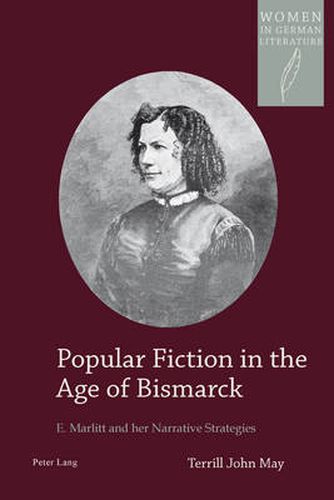Readings Newsletter
Become a Readings Member to make your shopping experience even easier.
Sign in or sign up for free!
You’re not far away from qualifying for FREE standard shipping within Australia
You’ve qualified for FREE standard shipping within Australia
The cart is loading…






This title is printed to order. This book may have been self-published. If so, we cannot guarantee the quality of the content. In the main most books will have gone through the editing process however some may not. We therefore suggest that you be aware of this before ordering this book. If in doubt check either the author or publisher’s details as we are unable to accept any returns unless they are faulty. Please contact us if you have any questions.
E. Marlitt was a bestselling author of the late nineteenth century whose romance novels dominated the German literary market between 1865 and 1888. Her novels appeared in thirty languages, with as many as five different English translations circulating simultaneously in the United States alone. While her name is virtually absent from histories of German literature, recent scholarly studies of individual novels suggest the need to reassess her contributions.
This study is the first in English to examine E. Marlitt’s complete fiction. It situates her prose against the backdrop of women’s discourse and nineteenth-century historical developments in the German Empire. It synthesizes findings of both American and German scholarship to show how her social constructs advanced a liberal political agenda while resisting the conventional view of natural gender roles. The book provides a context for recognizing Marlitt’s clever use of the conventionality and acceptability of the romance genre to reposition the image of middle-class women. Her emphasis on personal autonomy, educational opportunities and new fields of professional engagement for women advanced altered images of family, class and national identity. Ultimately, this study of a popular author illuminates domestic, middle-class issues that underwent significant transformations equal to the Empire’s public developments under Bismarck’s politics.
$9.00 standard shipping within Australia
FREE standard shipping within Australia for orders over $100.00
Express & International shipping calculated at checkout
This title is printed to order. This book may have been self-published. If so, we cannot guarantee the quality of the content. In the main most books will have gone through the editing process however some may not. We therefore suggest that you be aware of this before ordering this book. If in doubt check either the author or publisher’s details as we are unable to accept any returns unless they are faulty. Please contact us if you have any questions.
E. Marlitt was a bestselling author of the late nineteenth century whose romance novels dominated the German literary market between 1865 and 1888. Her novels appeared in thirty languages, with as many as five different English translations circulating simultaneously in the United States alone. While her name is virtually absent from histories of German literature, recent scholarly studies of individual novels suggest the need to reassess her contributions.
This study is the first in English to examine E. Marlitt’s complete fiction. It situates her prose against the backdrop of women’s discourse and nineteenth-century historical developments in the German Empire. It synthesizes findings of both American and German scholarship to show how her social constructs advanced a liberal political agenda while resisting the conventional view of natural gender roles. The book provides a context for recognizing Marlitt’s clever use of the conventionality and acceptability of the romance genre to reposition the image of middle-class women. Her emphasis on personal autonomy, educational opportunities and new fields of professional engagement for women advanced altered images of family, class and national identity. Ultimately, this study of a popular author illuminates domestic, middle-class issues that underwent significant transformations equal to the Empire’s public developments under Bismarck’s politics.